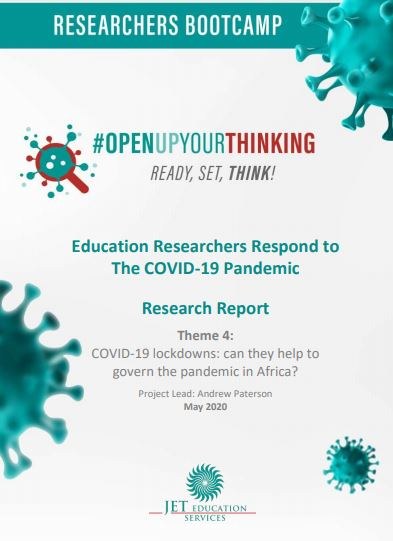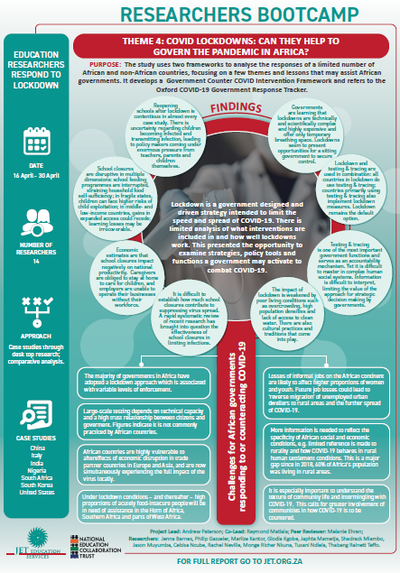
Theme 4: COVID-19 lockdowns: can they help to govern the pandemic in Africa?
Governance structures that have enabled efficient crisis management across three distinct settings: Looking for ways to effectively govern the pandemic
Lead Researcher: Dr Andrew Paterson, JET Education Services
Co-lead: Raymond Matlala, JET Education Services
Peer Reviewer: Prof. Melanie Ehren, Vrijie Universiteit, Amsterdam
Researchers: Jenna Barnes, Philip Gasseler, Marlize Kantor, Glodia Kgobe, Shadrack Mlambo, Jason Muyumba, Cebisa Ncube, Felicitas Ndlela, Monge Richer Nkuna, Tusani Sinethemba , Thabang Rainett Teffo
Download the final report and infographic
|
Download the research report for theme 4
|
View the infographic for theme 4
|
INTRODUCTION
As of late March 2020 there is neither an effective drug, nor a vaccine available to defend against COVID-19, a new infectious disease with high transmission rate. We are learning from experience that the impact of the COVID-19 pandemic on any country is highly complex and makes demands on practically all structures of government. This is because pandemic conditions threaten the totality of human societies such as disrupting and compromising: health and security, economic production, distribution of goods and services by public and private sector. It also places high stress on levels of social cohesion and trust in systems of national and global governance.
How are countries responding to the crisis?
Responses
There is little doubt that as long as COVID-19 remains unchecked in a country, systems of economic production and sources of social reproduction will atrophy. The central question that all governments face is: how to bring COVID-19 under control. In the absence of effective medicines or vaccine, governments must find alternative ways to effectively govern COVID-19 or face intolerable levels of uncertainty. Our aim is to examine how and by what means at their disposal governments have so far implemented non-pharmacological strategies to contain COVID-19.
Analytic focus
We will address this analytic challenge with reference to the various institutions that governments as part of their mandate have at their disposal to secure: governance, justice and rule of law, delivery of public goods and services, servicing the welfare needs of the population, promotion of economic growth and development, and reduction of inequality and poverty.
We understand governance to refer to a relatively complex arrangement of and relations between the parts or elements of a system and prefer to take a macro perspective. We aim to identify how governments mobilise functions in order to bring controls to bear on COVID-19.
STRUCTURE OF THE PROJECT
The project has 4 main elements:
- To develop and present a framework for identifying government’s functions that are relevant to dealing with COVID-19 mainly through forms of what is referred to as ‘social distancing’.
- To apply the framework to a small number of case studies taking into account unique features of the government response, how long COVID-19 has been present in the country, and country type (perhaps: high, upper-middle, lower-middle, and low income). The choice of case studies is also influenced by the timing of COVID-19 migration within countries and regions. Due to time constraints on completing this research the number of cases has to be limited. Proposed cases: China, South Korea, European country (perhaps Italy, Spain, France) - perhaps also a small section on “EU-overview”, India, South Africa, USA, Russia.
- To present a comparative synthesis of the findings that highlights emerging types of government/state response to COVID-19. To identify the achievements and challenges. To discuss the contribution of schooling systems in support of government COVID-19 containment strategy.
- To identify the achievements and challenges and to discuss the contribution of schooling systems in support of government COVID-19 containment strategy.
SOURCES
The project will focus on retrieving relevant online documentation.
In these extraordinary circumstances this project may contribute to – even influence – urgent debates about government policy and strategic decision making on next steps in combating COVID-19.

